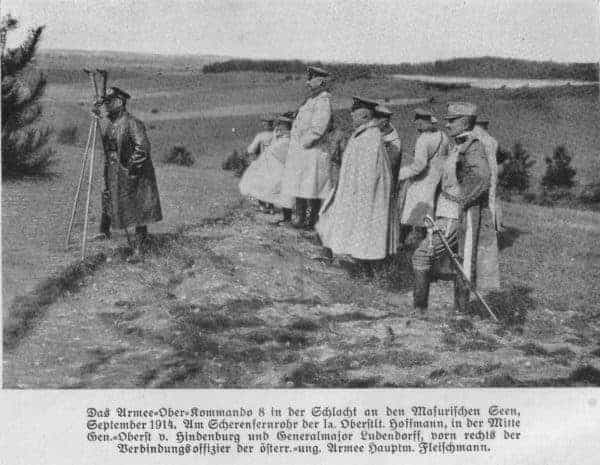On this day in 1915, in the depths of winter and in the middle of a snowstorm, the German Eight army launched a surprise attack on the Russian army. The German attack was centered on the area around the Masurian Lakes. The area had also been the scene of another battle the previous autumn. In the previous battle, the Germans inflicted a heavy, but not decisive defeat on the Russian army.
The attack launched on this day in 1915 marked a new stage in the war on the Eastern Front. The Russians had invaded East Prussia in August 1914, to the surprise of the Germans. It took the combined tactical brilliance of General Ludendorff and Field Marshal von Hindenburg to defeat the Russian invasion. The second battle of Masurian Lakes marked a new and aggressive approach by the Germans. From this date on, the Germans were nearly always on the offensive on the Eastern Front. The Germans wanted to inflict a heavy defeat on the Russians. The armies of the Tsar had suffered massive losses in the autumn, and Hindenburg and other leading Generals believed that if they inflicted another heavy defeat on the Russians, they would be able to withdraw from the war. This would allow them to concentrate fully on the western allies.

On the first day of the Battle, the German 8th Army managed to drive the Russians back, but they soon managed to establish a new defensive line. Then the German 10th Army attacked the Russians from the north. Under General Sievers, the Russian army retreated to a large and dense forest. They were on the verge of being surrounded. However, despite being outnumbered, the Russian XX Corps managed to hold their positions and this prevented the Russians from being surrounded. This allowed the rest of the Russian army to retreat. The XX Corps suffered heavy casualties during this time. However, they probably saved the Russian forces in the area from being completely annihilated. Some 50,000 Russians were killed or taken prisoner.
The German losses were very light. Indeed, it is believed that as many Germans died from exposure and the cold as were killed in battle. The Imperial Germany Army managed to make broad gains on the front and they managed to advance over sixty miles. The Russians launched a counter-attack and this halted the German advance. This effectively ended any German hopes of ending the war quickly on the Eastern Front. It is widely believed that if the Germans had more troops on the Eastern Front, they could have inflicted a total defeat on the Russian forces at this time.

